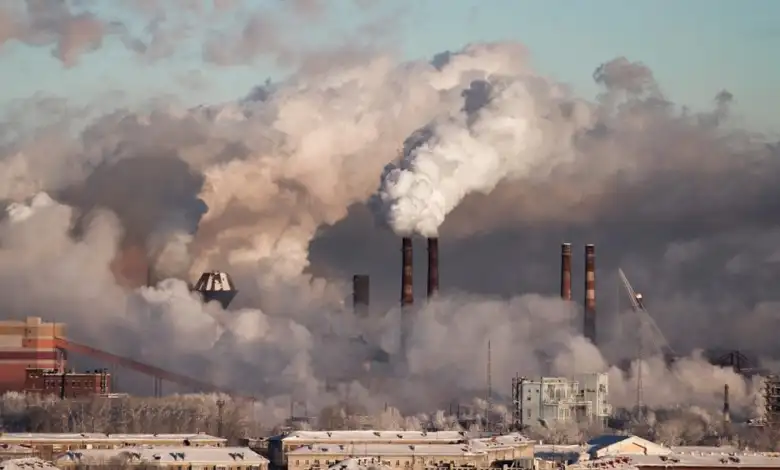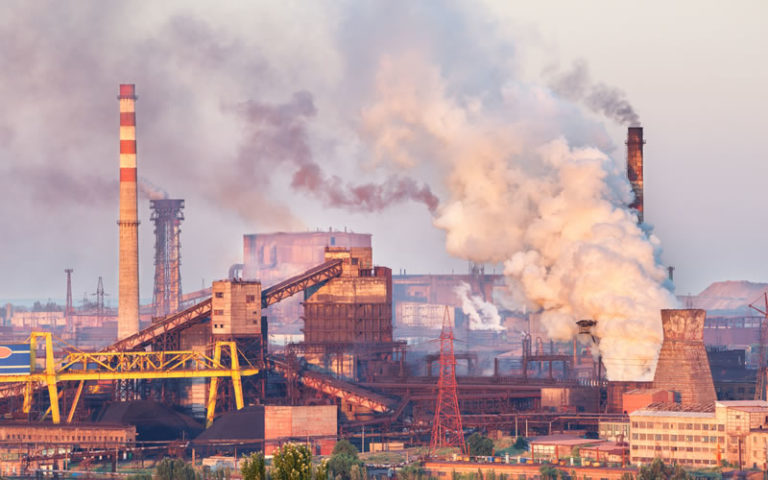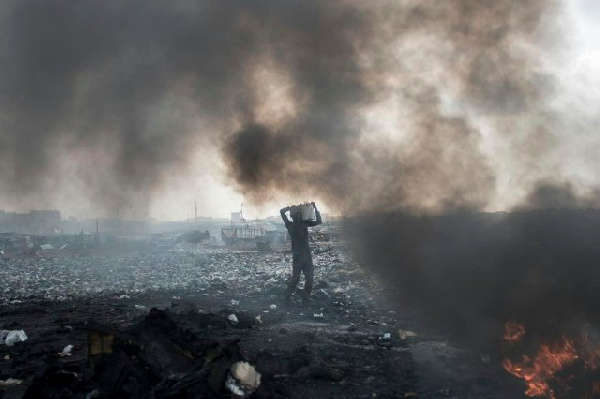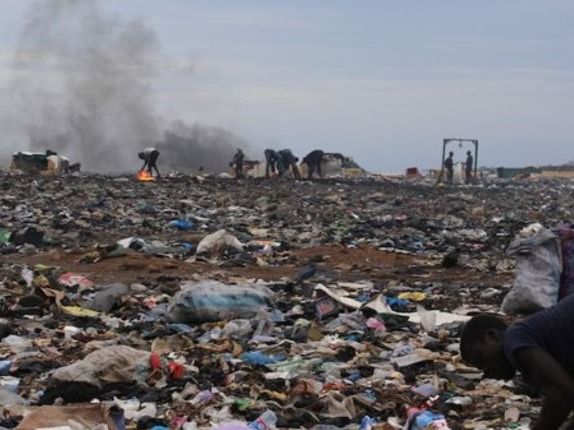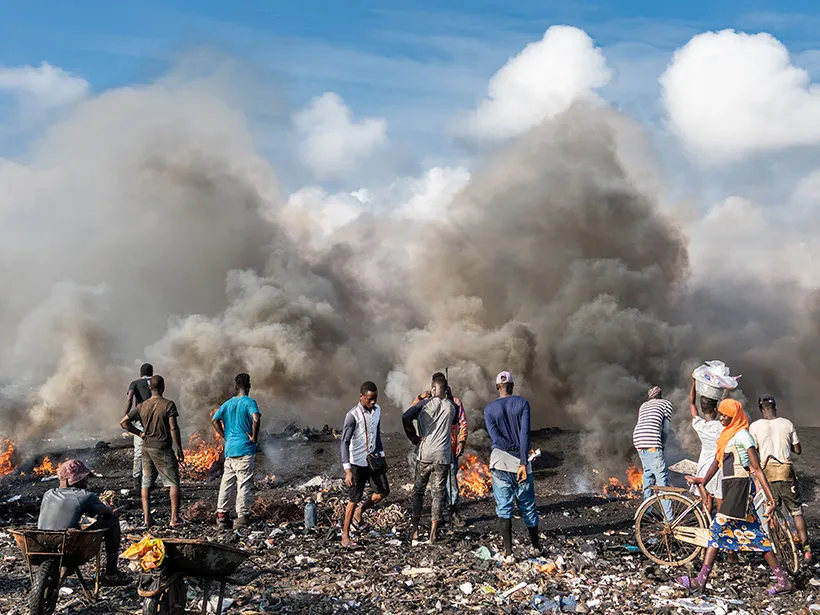
Problems
Air pollution in Accra, Ghana
Air pollution remains Ghana's number one environmental health risk. It accounts for about 8% of total annual mortality. The economic cost of air pollution is estimated at $2.5 billion, about 4.2% of Ghana's GDP. Because air quality is invisible, it appears to be a silent killer.
The link between public health and air pollution
In Ghana, thousands of premature deaths can be linked to poor air quality. There is growing scientific evidence that poor air quality is linked to heart disease, stroke, lung disease including lung cancer, chronic cough, asthma, and, most recently, the effects of coronavirus disease.
Causes of Air Pollution in Ghana
There may be a few causes of air pollution in Ghana, but they have had a huge impact on the health and well-being of Ghanaians and their environment. In particular, the main sources of air pollution in the Greater Accra area are industrial facilities, vehicle traffic, landfills, and domestic activities. This has attracted the attention of foreign organizations and non-governmental organizations seeking to understand what can be done to improve Ghana's air pollution situation. Below are the top 5 causes of air pollution in Ghana. ● Fashion waste ● Electronic waste ● Indoor pollution ● Construction dust ● Emissions from industry and factories
Fashion Waste
Today, fast fashion brands are overproducing to keep up with current trends, creating a huge environmental problem in West Africa. Fifteen million used clothing items are imported into Ghana every week. These second-hand clothes are unwanted fashion fringes of the Western world. Every day ships bring 160 tons of old clothes into the country. Clothes donated to charity in Europe or the United States are unwanted in the developed world. 40% of what goes on the market goes directly to landfills, creating mountains of unwanted clothing where it is burned, causing air pollution. The fashion industry loses about $500 billion a year to fashion waste. It causes an environmental disaster. This smoke doesn't make you sick immediately, but over a long period, it negatively impacts your health. Smoke is unhealthy when inhaled. It's hard to breathe, making city dwellers sick all too often.
Electronic Waste
Workers burn electronic cables to extract precious metals at a landfill in Agbogblosha, the capital of Ghana, Accra. Electronic items with high copper content are in high demand by scrap metal dealers. When they burn these electronic materials, the smoke released is very toxic to their health and the environment. Only the part containing cables and metal and plastic castings is sent for recycling. The rest is discarded or incinerated since there are virtually no e-waste recycling facilities in the country. When it rains, the ash is washed into nearby ponds and rivers where animals graze. Many of the chemicals present in these electronic devices are environmentally persistent, meaning they remain in the environment for a long period after being discarded.
Indoor Pollution
Indoor air pollution is now the number one cause of death in the world. According to the World Health Organization, about one-third of the world's solid fuels come from plant-based cooking materials, one of which is Ghana. These fuels are often used in an open fire or traditional stove, resulting in significant residential air pollution. Women and children are especially vulnerable to the toxic effects of pollution and are also exposed to the highest concentrations.
Construction Dust
Dust pollution is a serious problem in some parts of Ghana. This is important because of the construction work being done in the area to improve roads. Residents and commuters are forced to wear masks to protect themselves. To travel only a short distance, people are forced to wear different body, face, and nose coverings to avoid the deep penetration of dust for at least 30 minutes of travel.
Emissions from industry and factories
It would take a nose mask to survive a day or two in the free zone enclave of Tema (the area where most of the steel mills are located). But in the case of most factory workers, they have no choice but to inhale sulfur-rich smoke every day as they go about their daily business. The radiation darkens the environment, making it difficult to see or breathe. Some workers vomit blood because of the smoke, so they visit hospitals again and again. Poor air quality is killing people. A World Health Organization report today says that for 4.2 years, bad ambient air is responsible for over 2016 million premature deaths each year, of which about 90% of the deaths occur in low- and middle-income countries, including Ghana.
Gallery
5Timelines
2022
January 01
The average PM2.5 concentration in 2021 in the country of Ghana is 5.2 times the WHO-recommended annual average air quality.
2019
December 08
According to IQAir AirVisual's 2019 World Air Quality Report, Ghana ranks second in Africa for air pollution. Annual average concentrations of PM 2.5 in Ghana are well over six times WHO's guidelines of 31.1 micrograms per cubic meter [μg/m3] of ultrafine particles 2.5 micrometers or less in diameter, which are known to pose health risks. as they can clog a person's lungs.
2018
October 24
People in Ghana are more likely to die from air pollution than residents of some other comparable countries, such as Kenya (more than twice as likely) and Rwanda (0.6), and about 28 times more likely to die from air pollution than in Finland and New York the latest WHO data on global air pollution showed. According to the WHO, approximately 203 of every 100,000 deaths in Ghana are attributable to air pollution.
August 15
According to data released by the Ghana EPA, average annual air pollution levels in Accra are about five times the WHO average benchmark for the most health-threatening fine particles PM.2.5.
2017
According to the latest data from the World Health Organization, an estimated 28,210 residents died prematurely in 2016 as a result of exposure to air pollution.
2015
September 08
The Ghana Standards Commission, the Environmental Protection Agency, and other creditworthy departments have made great efforts to set emission limits for some industrial and commercial activities. Despite these efforts, some industrial emissions are not regulated, making monitoring difficult. Soap-making, wood processing, and chemical storage facilities commonly add to air pollution in communities. Faulty cars freely drive on roads, emitting abnormal exhaust fumes. Wood dust, ash, and dust from road construction are common in the air in Ghana. These pollutants pose health risks, potentially cause acid rain, and contribute to climate change.
2012
December 25
The death rate from air pollution in Ghana in 2012 was 80 for every 100,000 people.
